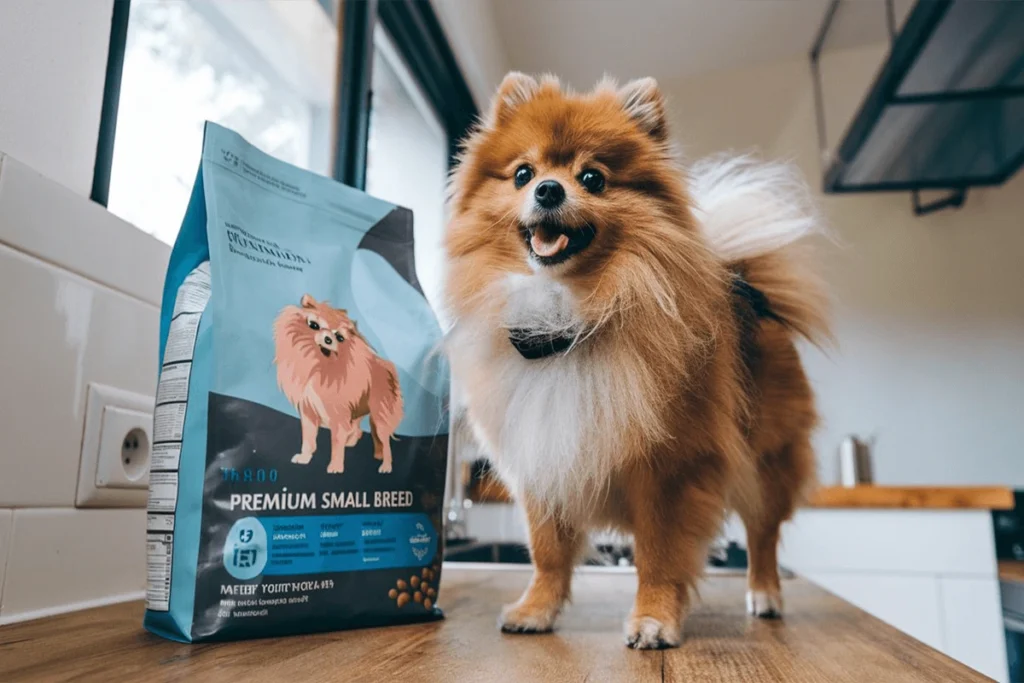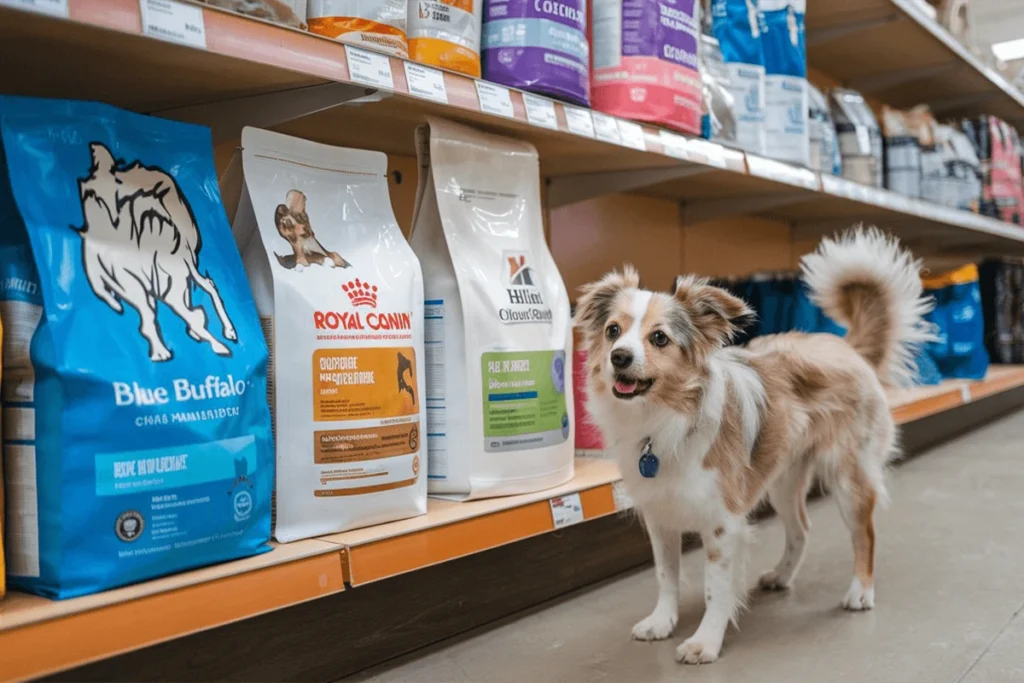Feeding your small dog the right small breed dog food is essential for their overall health, happiness, and longevity. Unlike larger breeds, small dogs have faster metabolisms and require calorie-dense meals packed with high-quality nutrients. Choosing the wrong food can lead to digestive issues, weight problems, and nutrient deficiencies, which may impact their energy levels and overall well-being.
Small breeds, such as Chihuahuas, Pomeranians, and Maltese, need a diet tailored to their specific needs. Their tiny stomachs can’t handle large portions, so every bite should be filled with essential nutrients like high-protein sources, omega-3 fatty acids, fiber, and probiotics. The right food supports their digestive health, keeps their coats shiny, and helps maintain strong teeth and bones.
This guide will walk you through everything you need to know about small breed dog food, from choosing the best kibble and wet food to understanding the difference between puppy and adult nutrition. Whether you’re looking for high-protein formulas, grain-free options, or the best brands available, this article will help you make informed decisions to keep your small dog healthy and thriving.
Understanding Small Breed Dog Nutrition
Why Small Breeds Have Unique Nutritional Needs
Small dogs may be tiny, but their nutritional needs are far from small. Unlike larger breeds, small dogs burn calories at a much faster rate because they have higher metabolic rates. This means they need small breed dog food that provides concentrated energy in smaller portions. Feeding them standard dog food may not meet their energy demands, leading to fatigue or weight fluctuations.
Portion size also plays a crucial role in their diet. Small dogs have tiny stomachs, so they can’t eat large meals in one sitting. They need nutrient-dense food with the right balance of protein, healthy fats, and carbohydrates to sustain their energy levels throughout the day. Inadequate nutrition can lead to hypoglycemia, a common issue in toy breeds like Chihuahuas and Pomeranians.
Additionally, small breeds have unique jaw and dental structures that require specially designed kibble. Standard kibble might be too large or too hard for them to chew properly, increasing the risk of dental issues. Choosing small breed dog food with appropriately sized kibble can help maintain their dental health while making mealtime easier and more enjoyable.
Essential Nutrients for Small Dogs
Feeding small dogs the right nutrients keeps them active, supports their immune system, and helps prevent health issues. A well-balanced small breed dog food should include:
- High-Quality Protein – Small dogs need protein-rich food to maintain muscle strength and energy. Look for ingredients like real chicken, turkey, beef, or fish in their food. High-protein small dog food supports lean muscle mass and prevents excessive weight gain.
- Healthy Fats & Omega-3s – Essential fatty acids, particularly omega-3 and omega-6, promote a healthy coat, reduce inflammation, and support brain function. Fish oil and flaxseed are great sources of these nutrients.
- Fiber & Probiotics – Small breed dogs often have sensitive stomachs. Fiber from sweet potatoes, pumpkin, and brown rice aids digestion, while probiotics support gut health and prevent bloating or diarrhea.
- Essential Vitamins & Minerals – Calcium, phosphorus, and vitamin D help maintain strong bones and teeth, while antioxidants like vitamin E and C boost the immune system.
- Complex Carbohydrates – Small dogs need slow-burning energy from healthy carbs like brown rice, oatmeal, or sweet potatoes to keep them energized throughout the day.
Choosing small breed dog food rich in these nutrients ensures your dog stays healthy, maintains a balanced weight, and has the energy to stay active.
Wet Food vs. Dry Food: Which Is Better?
Dog owners often struggle to decide between wet and dry food for their small breed dogs. Each type has its benefits, and the best choice depends on your dog’s health, preference, and lifestyle.
- Dry Food (Kibble):
- Convenient and easy to store.
- Helps lower the buildup of plaque and tartar, which makes your teeth healthier.
- Often more affordable and lasts longer than wet food.
- Specially formulated small breed dog food kibble is designed for smaller jaws, making it easier to chew.
- Wet Food (Canned or Pouches):
- Higher moisture content helps with hydration, especially for dogs that don’t drink enough water.
- Softer texture makes it ideal for small dogs with dental issues or picky eaters.
- Often contains more protein and fewer carbohydrates compared to kibble.
Many pet owners find that a combination of both works best. Mixing wet and dry small breed dog food provides the benefits of both textures, keeping meals interesting while ensuring proper nutrition. If your small dog prefers one type over the other, make sure it still meets their dietary needs and supports their overall health.
Choosing the Best Dog Food for Small Breeds
High-Protein Small Dog Food: Why It Matters
Protein plays a vital role in keeping small breed dogs strong, energetic, and healthy. Since small dogs have faster metabolisms, they burn calories quickly and need a diet rich in high-quality protein to maintain muscle mass and sustain their energy levels throughout the day. Feeding them small breed dog food with a high-protein formula helps prevent muscle loss, supports a healthy immune system, and promotes overall well-being.
The best protein sources for small dogs come from real meat like chicken, turkey, beef, lamb, and fish. Plant-based proteins like peas and lentils can supplement their diet but should not replace animal proteins, as small dogs thrive on meat-based nutrition. High-protein small breed dog food is especially beneficial for active breeds, such as Jack Russell Terriers or Miniature Pinschers, who need extra energy for their playful and active lifestyles.
However, not all high-protein dog foods are the same. Some contain excessive protein levels that may be hard on a small dog’s kidneys, especially if they have pre-existing health conditions. The key is balance—choosing a food with at least 25-30% protein from quality animal sources ensures your small dog gets the right nutrition without overloading their system.

Grain-Free Small Dog Food: Is It Right for Your Pup?
Grain-free small breed dog food has gained popularity in recent years, with many dog owners believing it’s a healthier choice. While grain-free diets can be beneficial for some dogs, they are not necessarily the best option for every small breed. Understanding the pros and cons can help you determine if this diet is right for your pup.
Grain-free dog food eliminates common grains like wheat, corn, and soy, replacing them with alternative carbohydrate sources such as sweet potatoes, peas, and lentils. This type of diet is ideal for small dogs with grain allergies or sensitivities, as it helps reduce digestive issues, skin irritation, and excessive itching. If your dog frequently suffers from bloating, diarrhea, or itchy skin, switching to a grain-free small breed dog food may help alleviate these symptoms.
However, some grain-free formulas replace grains with excessive legumes, which have been linked to potential heart health concerns in dogs. Not all small dogs need to avoid grains, and whole grains like brown rice and oatmeal can provide essential fiber and nutrients. The best approach is to consult your veterinarian before making the switch to ensure a grain-free diet is truly beneficial for your dog’s specific needs.
Best Kibble for Toy Breeds: What to Look For
Toy breeds, such as Chihuahuas, Yorkies, and Pomeranians, have tiny mouths and delicate jaws, making it essential to choose the right kibble size and texture. Regular dog kibble is often too large or too hard for toy breeds to chew properly, which can lead to difficulty eating and potential choking hazards. Specially formulated small breed dog food features smaller kibble pieces that are easier to chew and digest.
When selecting the best kibble for toy breeds, consider the following factors:
- Size and Shape: Look for small, bite-sized pieces designed for tiny mouths. Round or slightly flattened kibble is easier for toy breeds to chew than large or irregularly shaped pieces.
- Nutrient Density: Since toy breeds eat smaller portions, their food needs to be packed with high-quality protein, healthy fats, and essential vitamins. A well-balanced small breed dog food ensures they get the nutrients they need in every bite.
- Dental Health Benefits: Some kibble formulas are designed to help reduce plaque and tartar buildup, promoting better oral health. Look for options with a crunchy texture that supports dental hygiene.
Choosing the best kibble ensures your toy breed gets the right nutrition while making mealtime a safe and enjoyable experience. Always check the ingredient list to ensure the food contains high-quality proteins and essential nutrients tailored to your small dog’s unique dietary needs.
Small Breed Puppy Food vs. Adult Food
Nutritional Differences Between Puppies and Adults
Small breed puppies have different dietary needs compared to adult dogs. Since they are in a crucial growth phase, they require small breed dog food that supports their development, bone strength, and immune health. Puppies burn energy rapidly and need food that provides higher levels of protein, fat, and essential nutrients to fuel their growth and keep up with their active nature.
- Higher Protein Content – Small breed puppies need a diet rich in protein to support muscle and tissue development. Look for puppy formulas that contain at least 25-30% high-quality protein from real meat sources like chicken, turkey, or fish.
- More Healthy Fats – Puppies require more fat than adults because it provides essential energy and supports brain and vision development. Healthy fats like omega-3 and omega-6, found in fish oil and flaxseed, are vital for cognitive function and a healthy coat.
- DHA and Essential Vitamins – DHA (docosahexaenoic acid) is an omega-3 fatty acid that promotes brain and eye development in puppies. Puppy-specific small breed dog food should also include calcium, phosphorus, and antioxidants for strong bones and a robust immune system.
- Smaller Kibble Size – Puppy kibble is specially designed for tiny mouths and developing teeth, making it easier to chew and digest.

Adult small breed dogs, on the other hand, need food that focuses on maintaining a healthy weight, supporting joint health, and providing sustained energy. Their diets should have a balanced mix of protein, fat, and fiber to prevent obesity and ensure long-term well-being.
Top Small Breed Puppy Food Recommendations
Choosing the best small breed dog food for puppies ensures they get the right nutrition for healthy growth and development. Some of the top-rated options include:
- Royal Canin Small Puppy Formula – Specially designed for small breed puppies, this formula contains highly digestible proteins, prebiotics, and antioxidants to support digestion and immune health.
- Blue Buffalo Life Protection Small Breed Puppy – Made with real chicken, brown rice, and DHA for brain development, this kibble supports muscle growth and overall health.
- Hill’s Science Diet Small Paws Puppy – Formulated with high-quality ingredients, including omega-3 fatty acids and balanced minerals, to promote bone and brain development.
- Wellness CORE Small Breed Puppy – A high-protein, grain-free option packed with DHA, probiotics, and antioxidants to fuel small breed puppies with optimal nutrition.
When selecting a small breed dog food for your puppy, always check the ingredient list to ensure it includes real meat, essential vitamins, and no artificial additives. Puppies thrive on nutrient-rich diets, so investing in high-quality food will set the foundation for a healthy adulthood.
When and How to Transition to Adult Food
Small breed puppies grow quickly, but they still need puppy-specific nutrition for the first several months of their lives. The transition to adult small breed dog food should happen gradually to prevent digestive issues and ensure a smooth adjustment to their new diet.
- When to Transition: Small breeds typically reach adulthood around 9-12 months old. However, toy breeds may take a little longer, up to 14 months, before they are fully developed and ready for adult food.
- How to Transition: Switching food too quickly can cause stomach upset. Instead, follow a gradual transition plan over 7-10 days:
- Days 1-3: Mix 75% puppy food with 25% adult food.
- Days 4-6: Increase to 50% puppy food and 50% adult food.
- Days 7-9: Mix 25% puppy food with 75% adult food.
- Day 10: Fully transition to 100% adult small breed dog food.
During the transition, monitor your dog’s digestion, appetite, and energy levels. If they experience diarrhea, vomiting, or reluctance to eat, slow down the process and consult a veterinarian for guidance.
Providing the right small breed dog food at every stage of your dog’s life ensures they receive the nutrition they need to grow into a happy, healthy adult.
Health Benefits of a Proper Diet for Small Dogs
Small Breed Digestive Health: Avoiding Common Issues
Small breed dogs often have sensitive stomachs, making digestive health a top priority when choosing the right small breed dog food. Their fast metabolisms and smaller digestive systems require highly digestible food with the right balance of fiber, protein, and healthy fats. Feeding them the wrong diet can lead to common issues such as bloating, diarrhea, constipation, and food sensitivities.
- Choose Easily Digestible Ingredients – Small dogs process food differently than larger breeds, so they need high-quality proteins like chicken, turkey, or fish, along with easily digestible carbohydrates like sweet potatoes and brown rice. Avoid foods with excessive fillers, artificial additives, or low-quality meat by-products, as these can cause stomach discomfort.
- Prioritize Fiber and Probiotics – Fiber from natural sources like pumpkin, beet pulp, and oats promotes healthy digestion, while probiotics help maintain gut balance and prevent digestive issues like diarrhea or constipation. Look for small breed dog food that includes live probiotics for optimal gut health.
- Monitor Food Allergies and Sensitivities – Some small dogs develop sensitivities to grains, dairy, or certain proteins. If your dog frequently experiences digestive upset, consider switching to a limited-ingredient or grain-free small breed dog food to rule out allergies.

Feeding a well-balanced diet tailored to small breed digestion ensures your dog stays comfortable, energetic, and free from stomach-related issues.
Weight Management and Energy Levels
Small dogs have high energy levels but are also prone to weight gain, especially if they are overfed or eat calorie-dense food without enough exercise. Maintaining a proper balance between nutrition and activity is key to keeping your dog at a healthy weight.
- Control Portion Sizes – Overfeeding is one of the most common causes of obesity in small dogs. Unlike larger breeds, small dogs don’t require large portions, and feeding them too much can lead to excess weight gain. Follow the feeding guidelines on your small breed dog food and adjust based on your dog’s activity level.
- Choose Lean Proteins and Healthy Fats – High-protein small breed dog food supports muscle maintenance while preventing excess fat accumulation. Look for lean meat sources such as chicken, turkey, and fish, combined with healthy fats like omega-3s from fish oil, which help maintain energy without promoting unnecessary weight gain.
- Incorporate Regular Exercise – Even though small dogs don’t need as much space to run as larger breeds, they still require daily exercise to burn calories and stay active. Playtime, walks, and mentally stimulating activities help prevent obesity and ensure they maintain a healthy metabolism.
A well-managed diet combined with regular exercise helps small breed dogs stay energetic and fit, reducing the risk of obesity-related health issues like joint pain and heart disease.
Coat Care and Dental Health
The right small breed dog food plays a huge role in maintaining a shiny coat and strong teeth. Small dogs are prone to dental issues, while their coats require essential nutrients to stay healthy, soft, and free from excessive shedding.
- Omega-3 and Omega-6 for a Healthy Coat – Small breeds benefit from foods rich in omega-3 and omega-6 fatty acids, which promote soft, shiny fur and reduce inflammation that can lead to dry skin and itchiness. Ingredients like fish oil, flaxseed, and chicken fat provide the necessary fatty acids for a beautiful coat.
- Antioxidants and Vitamins for Skin Health – Vitamin E, biotin, and zinc are essential for preventing dry skin and keeping coats thick and strong. A high-quality small breed dog food should include these nutrients to support overall skin health.
- Kibble Designed for Dental Care – Small dogs are more likely to develop plaque and tartar buildup, leading to bad breath and dental disease. Specially formulated kibble for small breed dog food often has a crunchy texture that helps scrape away plaque and maintain oral hygiene. Adding dental chews or brushing their teeth regularly further improves their dental health.
By feeding your small dog the right nutrients, you not only enhance their external appearance but also support their overall well-being, keeping them happy, healthy, and full of life.
Best Dog Food Brands for Small Breeds
Top-Rated Brands
Choosing the best small breed dog food starts with selecting a high-quality brand that provides balanced nutrition. Some brands specialize in small breed formulas, ensuring the right kibble size, protein levels, and essential nutrients for smaller dogs. Here are some of the top-rated brands recommended by pet owners and veterinarians:
- Royal Canin Small Breed Formula – This brand creates breed-specific formulas with precisely tailored nutrition. Their small breed formulas support digestion, skin health, and energy needs while offering kibble designed for tiny mouths.
- Blue Buffalo Life Protection Small Breed – Made with real meat, wholesome grains, and antioxidant-rich LifeSource Bits, this formula supports immune health, strong muscles, and a healthy coat.
- Hill’s Science Diet Small Paws – This veterinarian-recommended brand offers small breed formulas with high-quality ingredients, omega fatty acids, and balanced minerals to support digestion and weight management.
- Wellness CORE Small Breed – A high-protein, grain-free option designed for small breeds that need lean muscle support and energy for an active lifestyle. It contains probiotics, antioxidants, and DHA for overall health.
- Merrick Lil’ Plates – This brand focuses on small breeds, offering both dry and wet food with real meat, probiotics, and healthy fats to promote digestion and a shiny coat.

Selecting a trusted brand ensures your small dog gets high-quality ingredients without fillers or artificial additives, supporting their overall health and well-being.
Specialized Diets
Every small breed dog has unique dietary needs, and some may require specialized diets to address health concerns or lifestyle factors. When choosing small breed dog food, consider these specialized diet options:
- High-Protein Diets – Active small breeds, such as Jack Russell Terriers or Miniature Pinschers, benefit from high-protein diets that support muscle maintenance and sustained energy.
- Grain-Free Diets – Ideal for dogs with grain allergies or sensitivities, grain-free formulas replace wheat, corn, and soy with alternative carbohydrates like sweet potatoes and lentils. However, not all dogs need grain-free food, so consult a vet before switching.
- Limited-Ingredient Diets – If your dog has food allergies or sensitivities, a limited-ingredient small breed dog food removes common allergens and focuses on simple, high-quality ingredients.
- Weight Management Diets – Small breeds prone to obesity, such as Pugs or Dachshunds, benefit from weight-control formulas with lower fat content and added fiber to promote fullness.
- Sensitive Stomach Diets – Dogs with digestive issues need highly digestible food with added probiotics and prebiotics to support gut health and prevent stomach upset.
Understanding your small dog’s dietary requirements helps you select a specialized formula that supports their health while preventing potential issues.
How to Choose the Right Brand for Your Dog’s Needs
With so many options available, finding the right small breed dog food brand can feel overwhelming. Consider these key factors to make an informed decision:
- Ingredient Quality – Look for real meat as the first ingredient, along with whole grains or grain-free alternatives, healthy fats, and essential vitamins. Avoid fillers, artificial preservatives, and by-products.
- Small Kibble Size – Ensure the kibble is designed for small jaws, making it easier to chew and digest.
- Tailored Nutrition – Choose a formula that meets your dog’s life stage (puppy, adult, senior) and health needs (weight control, digestive support, or high-protein).
- Reputation and Reviews – Research brands that have positive reviews, veterinarian recommendations, and a history of producing high-quality small breed dog food.
- Your Dog’s Preferences – Some dogs prefer dry kibble, while others enjoy wet food or a mix of both. Finding a food your dog enjoys while meeting their nutritional needs is essential.
By evaluating these factors, you can confidently choose the best small breed dog food that keeps your furry companion healthy, energetic, and happy.
Conclusion
Providing the best small breed dog food ensures your furry companion stays healthy, active, and full of life. Small dogs have unique nutritional needs that differ from larger breeds, requiring a carefully balanced diet rich in high-quality protein, healthy fats, and essential vitamins. Choosing the right food plays a crucial role in maintaining their digestive health, weight, coat condition, and overall well-being.
When selecting the perfect small breed dog food, consider your dog’s life stage, dietary preferences, and any specific health concerns. Puppies need nutrient-dense formulas with DHA and extra protein to support rapid growth, while adult dogs require balanced nutrition to sustain energy levels and maintain a healthy weight. Senior small dogs may benefit from joint-supporting ingredients like glucosamine and omega fatty acids.
Food quality matters just as much as portion control. Overfeeding can lead to obesity, while underfeeding may cause nutrient deficiencies. Choosing a top-rated brand that prioritizes real meat, natural ingredients, and breed-specific nutrition helps provide the best possible diet for your dog.
Additionally, considering specialized diets—such as grain-free, high-protein, or weight management formulas—can help address individual needs. Always monitor how your dog responds to their food, making adjustments if needed to ensure they stay energetic and happy.
By understanding the unique dietary requirements of small dogs and selecting the right small breed dog food, you can support their long-term health and happiness. Prioritizing proper nutrition helps your small dog thrive, giving them the best chance at a long, active, and joyful life.
You Can Read More About Unkibble Dog Food: What dog owners Must know!
Read More About wholesome dog food in This Article!
Read More about Dogs and Breeds From Here
Find The Some Good Stuff For your Dog Here on PetMD Official

1 thought on “Small Breed Dog Food: The Best Guide for a Healthy & Happy dog”
Comments are closed.